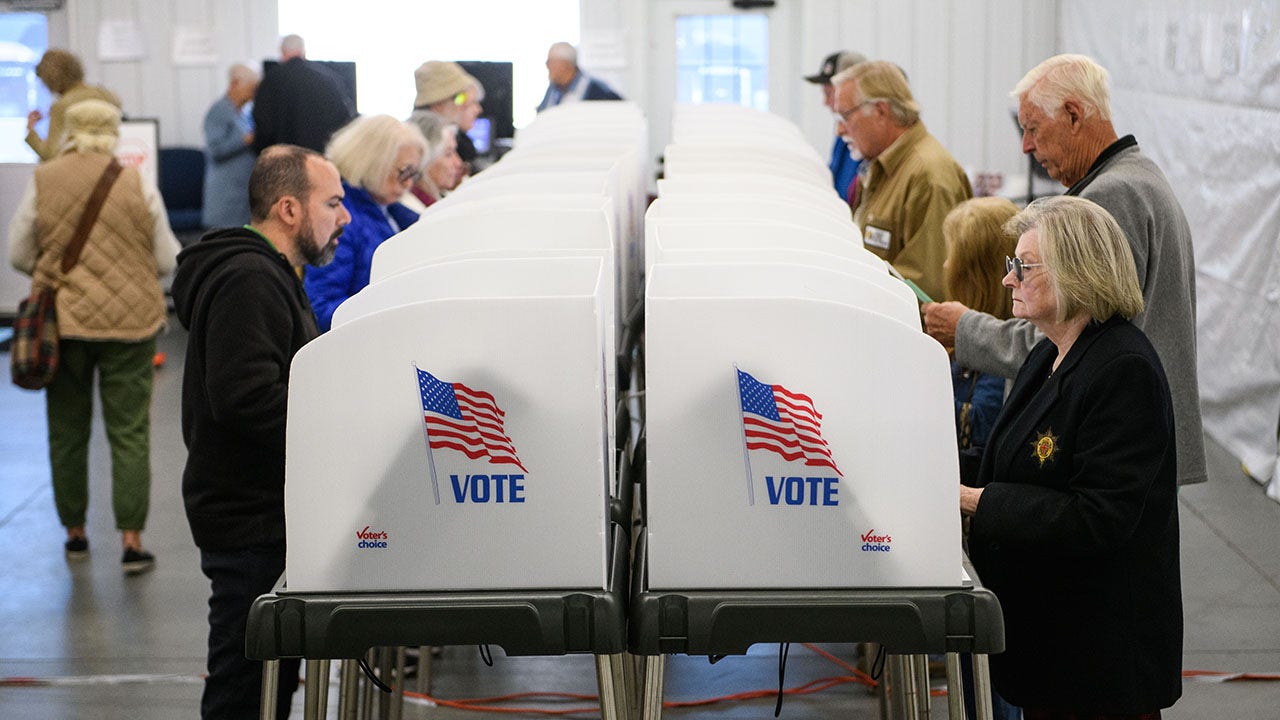New York
Harlem City Council Election Tests Limits of Progressive Politics

Two years ago, when a democratic socialist narrowly won a crowded Democratic primary for a City Council seat in Harlem, some saw it as a sign that the historically Black neighborhood was becoming more politically progressive.
But roughly a month before this year’s primary on June 27, the first-term councilwoman, Kristin Richardson Jordan, unexpectedly dropped out of the race. Her decision has recast the hotly contested Democratic primary, which now comprises three candidates — none particularly progressive.
Two are sitting State Assembly members: Al Taylor, 65, a reverend in his sixth year in the Legislature; and Inez Dickens, 73, who held the Harlem Council seat for 12 years before joining the Assembly. The third candidate is Yusef Salaam, 49, one of five men convicted and later exonerated in the rape and assault of a female jogger in Central Park in 1989.
All are moderate Democrats who, before Ms. Jordan’s withdrawal, had tried to distance themselves from Ms. Jordan and her political stances, which include redistributing wealth and abolishing the police.
But with the incumbent out of the race, the candidates have turned on each other. Mr. Salaam questioned Ms. Dickens’s behavior as a landlord, asking her during a debate how many people she had evicted in the last two decades. Ms. Dickens initially replied one, but The Daily News found that approximately 17 eviction proceedings had been initiated.
Ms. Dickens said her family-owned management companies rent units below market rate, and that some of the tenants involved in eviction proceedings were in arrears for four years or more. “I have done more to preserve and protect affordable housing in Harlem than any other candidate in this race,” Ms. Dickens said.
Her campaign, in turn, has questioned Mr. Salaam’s experience after his campaign appeared to be in deficit and over the $207,000 spending cap, before he filed amended paperwork.
The race then took a bizarre turn this week at a women’s rally for Ms. Dickens when the former Representative Charles B. Rangel, in recounting how Mr. Salaam had called him before entering the race, remarked that Mr. Salaam had a “foreign name.” Mr. Salaam responded on social media that “we all belong in New York City.” Mr. Rangel, through a spokeswoman for Ms. Dickens, said he intended no offense and meant foreign as being unknown to him.
The two men spoke on Friday afternoon and resolved the issue, representatives for both campaigns confirmed.
Ultimately, the race might be decided on issues more germane to the district, including the loss of Black residents, a lack of affordable housing and concerns about an oversaturation of drug treatment centers.
The three candidates hold stances that underscore how the district will soon be represented by a moderate. Ms. Dickens opposed the so-called good cause eviction measure, which would have limited a landlord’s ability to increase rents and evict tenants, had it passed the State Legislature. Mr. Taylor has in the past voted against abortion rights based on religious objections, but recently voted to support a measure that would let voters add an equal rights amendment to the State Constitution. Mr. Salaam supported congestion pricing, but said he still had reservations about how it would affect Harlem.
All three have garnered endorsements from mainstream Democratic groups and leaders: Ms. Dickens from the United Federation of Teachers and Representative Adriano Espaillat; Mr. Taylor from the New York City District Council of Carpenters; and Mr. Salaam was recruited to run for the seat by Keith L.T. Wright, the former assemblyman and chair of the Manhattan Democratic Party.
The Greater Harlem Coalition voted to endorse Ms. Dickens before Ms. Jordan dropped out of the race. The carpenters’ union said their sole objective was to defeat Ms. Jordan.
Mr. Taylor said that not all of Ms. Jordan’s supporters necessarily supported her most left-leaning stances like defunding the police. “I don’t think that she had cornered the market on this community,” he said in an interview.
Ms. Jordan’s victory in 2021 over the incumbent, Bill Perkins, was less a districtwide endorsement of far-left views, and more the culmination of “galvanized anti-establishment” sentiment that has been building against Harlem’s once powerful but now fading political machine, said Basil Smikle, director of the Public Policy Program at Hunter College.
“There is an interest in finding an alternative and setting a new course,” Mr. Smikle said.
Ms. Jordan, whose name will still be on the ballot, may have been her own worst enemy. She was criticized for using Council funds to promote her campaign. Her far-left stances on policing, housing development and the war in Ukraine drew backlash from colleagues and voters. She missed nearly half of her committee meetings, city records show.
Syderia Asberry-Chresfield, a co-founder of the Greater Harlem Coalition, a group that organizes against the oversaturation of social services in the neighborhood, felt that Ms. Jordan was too far to the left.
“We did understand that changes needed to be made,” Ms. Asberry-Chresfield said. “But some of her changes were so radical and she wasn’t willing to bend.”
Ms. Jordan declined to comment. But Charles Barron, a left-leaning councilman who represents East New York and is one of Ms. Jordan’s few allies on the City Council, said her leftist positions irritated mainstream Democratic leadership and their financial backers who “prefer establishment-type elected officials as opposed to independent, strong, Black radicals like she was.”
The remaining three candidates did not greatly differentiate themselves during a forum at the National Action Network in Harlem earlier this month and at a debate Tuesday night on NY1.
They are all in favor of the development of housing at 145th Street and Lenox Avenue, a proposal that Ms. Jordan initially rejected because it was not affordable enough. The candidates said they were not in favor of the city’s use of stop-and-frisk tactics, which a federal monitor recently said was being utilized in a discriminatory manner.
When it comes to the influx of migrants seeking asylum, Ms. Dickens, Mr. Taylor and Mr. Salaam said they support New York City’s status as a sanctuary city but questioned whether the billions of dollars being spent to house and feed migrants should also be available to New Yorkers experiencing homelessness.
None want Ms. Jordan’s endorsement.
Of the three, Mr. Salaam has gone most aggressively after Ms. Jordan’s likely supporters by using his conviction, exoneration and persecution by former President Donald J. Trump as the focus of his campaign. Speaking at a community center for older adults in East Harlem last week, Mr. Salaam drew the loudest applause when criticizing Mr. Trump, who in the 1989 bought full-page advertisements in four city newspapers, including The New York Times, to call for the death penalty to be reinstated because of the Central Park case.
“Who better to be a participant in leading the people than one who has been close to the pain?” Mr. Salaam said.
Mr. Salaam and Mr. Taylor sought to weaken Ms. Dickens’s chances by cross-endorsing one another on Tuesday. Voters can rank their choices in the three-way primary, and the men encouraged supporters to make the other their second choice. Two days later, Ms. Dickens responded by hosting the women’s rally where she said the two men in the race were plotting against her, and unveiling a more prestigious endorsement: Mayor Eric Adams.
Speaking at the Harriet Tubman Memorial in Harlem, the mayor highlighted Ms. Dickens’s moderate stances, saying that she understands the “balance between public safety and justice,” and that “it’s all right to have a city that’s friendly to businesses.”
At the recent National Action Network forum there was not an issue, from affordable housing to whether he supported closing the Rikers Island jail complex, that Mr. Salaam did not link to his conviction or the nearly seven years he spent in prison — to the visible annoyance of Ms. Dickens, who has emphasized her experience.
Mr. Salaam supports closing the Rikers Island jail complex and opening borough-based jails, while Ms. Dickens and Mr. Taylor have raised concerns about opening local jails.
That still has not helped Mr. Salaam gain the support of local progressives. A political action committee associated with Representative Alexandria Ocasio-Cortez endorsed Ms. Jordan when she first ran, but is unlikely to make a new endorsement.
National progressive figures such as Cornel West, the professor and activist who recently announced a run for president, and Keith Ellison, Minnesota’s progressive attorney general, have endorsed Mr. Salaam. .
“Donald Trump said he ought to have the death penalty,” Mr. Ellison said. “Who can talk about how the system needs to be better and more effective than Yusef Salaam?”

New York
N.Y.C.’s Mayoral Candidates Spent Millions on TV Ads. What Are They Saying?

Estimated spending on
broadcast ads that have aired
$1.1 million
$4.3 million
The Democrats running for mayor in New York City and a super PAC supporting Andrew M. Cuomo are spending millions to reach potential voters, with much of the spending going toward commercials on broadcast television. A New York Times analysis of the broadcast ads that have aired so far, using data from AdImpact, explored the major themes highlighted by the candidates: crime and safety, President Trump, affordable housing and corruption.
Among the ads aired,
seven mention crime and safety
3 ads
Mr. Cuomo, the former governor, has been framing himself as a law-and-order candidate who will crack down on crime and improve public safety. Ads run by Fix the City, the super PAC backing Mr. Cuomo, have depicted New York as a city in chaos. One of its ads opens with images of police sirens, caution tape and subway riders fleeing a smoke-filled train.
“Crime is rampant,” says a voiceover in another pro-Cuomo ad, also paid for by Fix the City. That ad also references Mr. Cuomo’s “five-borough crime and affordability plan,” which would add “5,000 more cops” to the streets.
Other candidates took a subtler approach. Scott Stringer, a former city comptroller, said in his only broadcast ad to air so far that he would “put a cop on every train” and “hire more mental health workers.” An ad for Brad Lander, the current city comptroller, tied the idea of safety to Mr. Lander’s plan to “end street homelessness for the mentally ill.” An ad for Zohran Mamdani, the state assemblyman, simply said he would make New York a “safer city.”
Among the ads aired,
five mention President Trump
2 ads
Taking jabs at Mr. Trump and his administration could almost be considered a requirement for candidates running in a Democratic primary in a city where former Vice President Kamala Harris won about 70 percent of votes in the 2024 presidential election. Still, some of the ads that mention the president are more direct than others.
An ad for Mr. Stringer was among the most explicit: “We deserve a mayor who can get our city back on track and keep this schmuck out of our business,” Mr. Stringer says over a clip of Mr. Trump dancing at a rally, adding that he will “tell Trump where to stick it.”
Mr. Lander drives a large forklift around a junkyard in his broadcast ad and places cars into a crushing machine. One of the cars has the words “Trump & Musk” in large black letters across the side.
Other candidates made only passing swipes at the president. Some of the ads supporting Mr. Cuomo mentioned that he took on Mr. Trump as governor and will again as mayor, and an ad for Mr. Mamdani said he would stand up to Mr. Trump. Mr. Myrie’s broadcast ad did not mention Mr. Trump.
All ads mention affordable housing
3 ads
Every broadcast ad reviewed in the analysis mentioned housing at least once. In one ad, Mr. Mamdani likened Mr. Cuomo to the current mayor, Eric Adams, whose housing policies have been similar to the former governor’s, and whose popularity declined after he was indicted on fraud and corruption charges in 2024. The Trump administration later dropped the charges.
“Cuomo is running for Adams’s second term,” Mr. Mamdani said in the ad, adding that he will “take on bad landlords and greedy corporations.”
Mr. Adams and Mr. Cuomo are both moderates who have many of the same donors, including powerful real estate leaders, and both have supported housing policies that are in stark contrast to Mr. Mamdani’s. The mayor and former governor both oppose freezing increases for rent-stabilized apartments, for example, while one of Mr. Mamdani’s ads is devoted solely to his plan to freeze rent prices.
In ads for other candidates, housing is mentioned only briefly. An ad by Fix the City for Mr. Cuomo said he will “cut red tape for affordable housing and build 500,000 new units.” In Mr. Stringer’s ad, he said he will “turn vacant lots into affordable apartments.” Mr. Myrie’s ad says he has “the boldest plan to build affordable housing.”
Among the ads aired,
three mention corruption
0 ads
Several of the candidates mentioned corruption in their ads. In Mr. Lander’s ad, a second car is brought out to be crushed, this one symbolizing “corruption,” specifically as it relates to Mr. Cuomo.
“Andrew Cuomo spent $60 million of your money to defend himself in court. That’s corrupt,” a voiceover says as the car is brought to the crushing machine. “But Brad Lander fights corruption.”
In the ad in which Mr. Mamdani compares Mr. Cuomo to Mr. Adams, the candidate paints the former governor and mayor as the corrupt establishment, responsible for making the city unaffordable.
“Working people are being pushed out of the city they built, and it’s because corrupt politicians like Eric Adams and Andrew Cuomo have sold us out to billionaires and corporations, rigging the economy against us,” Mr. Mamdani says over a series of images that combine Mr. Cuomo’s face and quotes about the former governor from news articles.
Mr. Stringer defines corruption less precisely, mentioning that he “fought corruption” as comptroller. The three pro-Cuomo broadcast ads by Fix the City did not mention corruption, nor did the ad for Mr. Myrie.
Total spending on advertising,
including future broadcast spots
| Total spent | Broadcast share | |
|---|---|---|
|
Fix the City (pro-Cuomo super PAC) |
$8.1 million | 91% |
 Mamdani |
$3.0 million | 41% |
 Lander |
$2.3 million | 72% |
 Stringer |
$1.9 million | 83% |
 Myrie |
$1.7 million | 27% |
Spending on ads that have already aired on broadcast television, which this analysis focused on, is one slice of candidates’ overall ad spending. They have also purchased broadcast spots to air more ads in the future, as well as ads on other platforms like streaming television, satellite and internet. Broadcast was, however, a major focus for the candidates.
Fix the City, the pro-Cuomo super PAC, has spent the most on advertising by far, with 91 percent of its spending devoted to commercials on broadcast networks. (Mr. Cuomo’s campaign has not yet aired any of its own ads on broadcast television, according to AdImpact.)
By contrast, the campaign for Mr. Mamdani, which has become known for its savvy approach to social media, has spent just 41 percent of its advertising budget on broadcast, according to the AdImpact data. (Mr. Mamdani’s campaign has, however, spent more on broadcast than any other individual platform.)
One of the leading Democrats in the mayor’s race, Adrienne Adams, the speaker of the New York City Council, has not yet aired an ad on broadcast television. The candidate struggled to raise funds early in her campaign, but recently got an infusion of $2 million from the city’s fund-matching program, which the campaign said it would use for an aggressive ad blitz in the coming weeks before the June 24 primary.
New York
Are You Smarter Than a Billionaire?

Over the course of one week, some of the richest people in the world descended on New York’s auction houses to purchase over $1 billion of art. It might have played out a little differently than you would have expected.
Can you guess which of these works sold for more?
Note: Listed sale prices include auction fees.
Image credits: “Untitled,” via Phillips; “Baby Boom,” via Christie’s Images LTD; “Hazy Sun,” With permission of the Renate, Hans & Maria Hofmann Trust/Artists Rights Society (ARS), New York; via Christie’s Images LTD; “Petit Matin,” via Christie’s Images LTD; “Concetto spaziale, La fine di Dio,” Artists Rights Society (ARS), New York/SIAE, Rome; via Sotheby’s; “Baroque Egg with Bow (Orange/Magenta),” via Sotheby’s; “The Last Supper,” The Andy Warhol Foundation for the Visual Arts, Inc./Licensed by Artists Rights Society (ARS), New York; via Christie’s Images LTD; “Campbell’s Soup I,” The Andy Warhol Foundation for the Visual Arts, Inc./Licensed by Artists Rights Society (ARS), New York; via Christie’s Images LTD; “Miss January,” via Christie’s Images LTD; “Fingermalerei – Akt,” via Sotheby’s; “Grande tête mince (Grande tête de Diego),” Succession Alberto Giacometti/Artists Rights Society (ARS), NY; via Sotheby’s; “Tête au long cou,” Succession Alberto Giacometti/ARS, NY/Photos: ADAGP Images/Paris 2025; via Christie’s Images LTD; “Revelacion,” Remedios Varo, Artists Rights Society (ARS), New York / VEGAP, Madrid; via Christie’s Images LTD; “Le jardin nocturne,” Foundation Paul Delvaux, Sint-Idesbald – ARS/SABAM Belgium; via Christie’s Images LTD.
Produced by Daniel Simmons-Ritchie.
New York
Video: How a Mexican Navy Ship Crashed Into the Brooklyn Bridge

On Saturday, a Mexican Navy ship on a good will tour left a New York City pier bound for Iceland. Four minutes later, it crashed into the Brooklyn Bridge. [Spanish] “It’s falling!” [English] “No way!” Here’s what happened. The Cuauhtémoc had been docked on the Lower East Side of Manhattan for four days, open to visitors looking for a cultural experience. As the ship prepared to leave on Saturday night, a tugboat arrived to escort it out of its pier at 8:20 p.m. The ship’s bow, the front of the vessel, faced Manhattan, meaning it would need to back out of its berth into the East River. As the Cuauhtémoc pulled away from shore, the tugboat appeared to push the side of the ship, helping to pivot the bow south toward its intended route. The river was flowing northeast toward the Brooklyn Bridge and the wind was blowing in roughly the same direction, potentially pushing the ship toward a collision. Photos and videos suggest the tugboat was not tied to the ship, limiting its ability to pull the ship away from the bridge. The Cuauhtémoc began to drift north, back first, up the river. Dr. Salvatore Mercogliano, who’s an adjunct professor at the U.S. Merchant Marine Academy, told The Times that the ship appeared to be giving off a wake. This suggests its propellers may have been running in reverse, pushing it faster toward the bridge. The tugboat sped alongside the ship as it headed north, possibly trying to get in front of it and help the ship maneuver the other way. But it was unable to cut the ship off or reverse its course. All three masts crashed into the underside of the Brooklyn Bridge at approximately 8:24 p.m., four minutes after the ship had left the pier, causing the top sails to collapse. Crew members standing on the masts during the collision were thrown off entirely. Others remained hanging from their harnesses. A New York City patrol boat arrived about eight minutes after the collision, followed quickly by a fire department boat. Additional law enforcement and emergency medical services removed the wounded for treatment. According to the Mexican Navy, two of the 227 people aboard the ship were killed and 22 others were injured.
-

 Movie Reviews1 week ago
Movie Reviews1 week agoMOVIE REVIEW – Mission: Impossible 8 has Tom Cruise facing his final reckoning
-

 Maryland1 week ago
Maryland1 week agoMaryland, Cornell to face off in NCAA men’s lacrosse championship game
-

 Tennessee1 week ago
Tennessee1 week agoTennessee ace Karlyn Pickens breaks her own record for fastest softball pitch ever thrown
-

 News1 week ago
News1 week agoHarvard has $52,000,000: Trump mounts attack, backs foreign student enrolment ban
-

 Utah1 week ago
Utah1 week agoUtah Republicans ignore study supporting gender-affirming care for trans youth. It's research they demanded
-

 Politics1 week ago
Politics1 week agoTrump admin asking federal agencies to cancel remaining Harvard contracts
-

 South-Carolina1 week ago
South-Carolina1 week agoSouth Carolina infant rescued from filthy home infested with animals, some dead
-

 News1 week ago
News1 week agoVideo: The Counties Where Trump Made Gains














